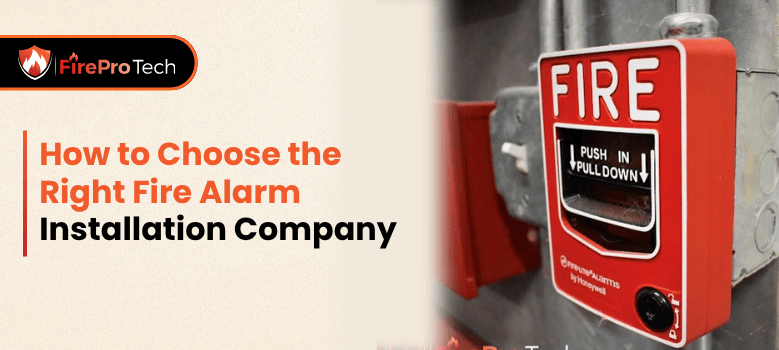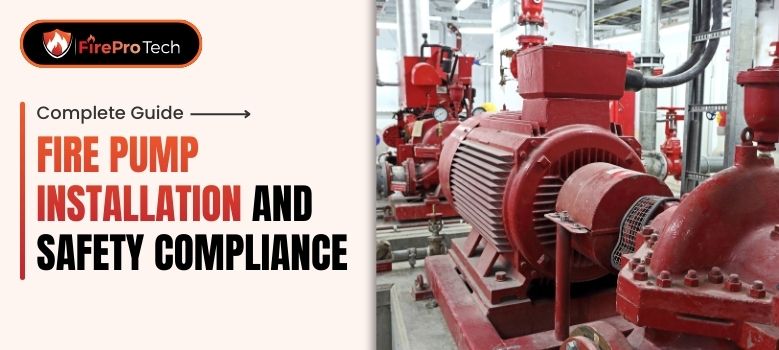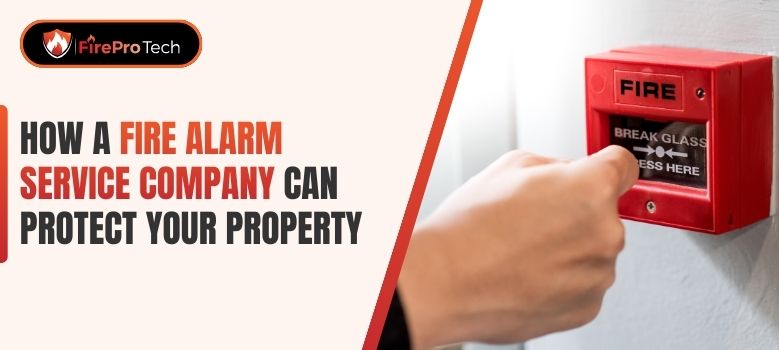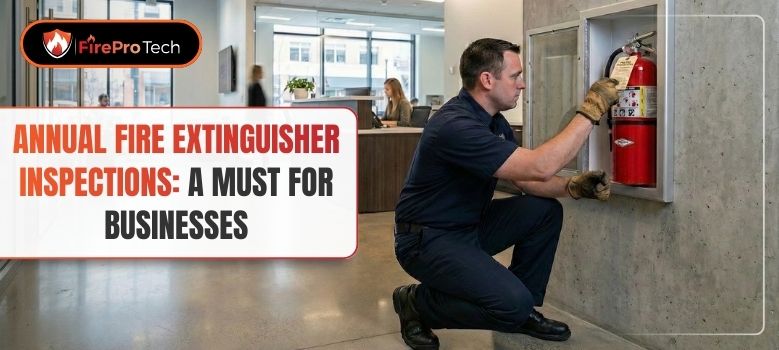
Choosing the right fire alarm installation partner is one of the most critical safety decisions you’ll make for your building. A properly installed fire alarm system doesn’t just meet code—it protects lives, safeguards property, and ensures business continuity in the event of an emergency. But with so many providers out there, how can you be sure you’re making the right call?
This guide will walk you through everything you need to know about identifying a trusted provider. From understanding your property’s unique fire protection needs to decoding certifications and comparing service capabilities, we’ll help you make an informed, confident decision.
Not all companies offering fire alarm installation are created equal. While many claim to provide reliable solutions, only a select few combine technical expertise, code compliance, customer service, and long-term support into a seamless experience. Here’s what you should look for when evaluating providers.
The best fire alarm installation companies have a proven track record across various facility types. Whether you manage a high-rise, warehouse, school, or healthcare facility, you need a provider that understands the nuances of system design for your specific environment.
Experienced contractors can anticipate installation challenges, recommend the most appropriate alarm system technology, and integrate seamlessly with existing building infrastructure. Without that depth of knowledge, your system could end up underperforming—or worse, out of code.
Reliable fire alarm installation companies carry certifications that demonstrate competence and compliance with industry standards. Technicians should hold credentials like NICET certification in fire alarm systems, and the company should be licensed to operate within your jurisdiction.
In addition, approval from third-party organizations like UL or FM Global offers assurance that the company’s installations meet rigorous performance and safety standards.
A dependable fire alarm installation company does more than just wiring devices. Look for a partner that offers end-to-end services, including system design, permitting, equipment sourcing, installation, testing, training, and future inspections.
When a provider offers ongoing maintenance and emergency support as well, you’re setting your facility up for long-term success. Avoid firms that treat installation as a one-off job and instead align with those committed to your fire protection for the long haul.
Book your Fire Alarm Installation now!
Before any equipment is purchased or wires are run, a detailed understanding of your building’s unique fire risks and code mandates is essential. The best fire alarm installation begins with a comprehensive site assessment and an informed strategy.
Every structure presents different fire safety challenges depending on its size, design, occupancy type, and use. For example, an industrial facility with flammable materials requires different alarm zoning and notification strategies than a corporate office with multiple tenant suites.
A thorough fire alarm system installation starts with analyzing your floor plans, ceiling heights, HVAC layout, and potential obstructions. This ensures smoke detectors, pull stations, horns, and strobes are placed optimally to detect danger early and alert occupants effectively.
No fire alarm installation can be successful unless it fully complies with current building and fire codes. In most jurisdictions, this means aligning with the National Fire Protection Association’s NFPA 72 guidelines, which dictate everything from detector placement to audibility levels.
However, your local authority having jurisdiction (AHJ) may also impose unique requirements. A knowledgeable installer understands these regional variations and secures all necessary permits before beginning work. Failure to comply can result in costly fines, delays, or even system rejection during inspections.
Another crucial step in fire alarm system installation is understanding the fire risk associated with your operations and the maximum number of occupants in the building. This data influences the system classification—whether it needs to be manual, automatic, or addressable—and the level of redundancy required.
For instance, buildings with high occupant turnover, such as shopping malls or educational institutions, often require voice evacuation systems and enhanced zoning. Choosing the right fire alarm installation approach hinges on these risk assessments.
Secure safety with Fire Alarm Installation!
Understanding the different types of fire alarm systems is essential before starting any fire alarm installation. Your installer should be well-versed in all system categories and recommend one that suits your building’s layout, occupancy, and fire risk profile. The wrong system can lead to inefficiencies, delayed detection, or even code violations.
Conventional systems divide a building into detection zones, each wired to a central control panel. When an alarm activates, the panel identifies the zone, but not the specific device. These systems are ideal for smaller buildings or properties with straightforward layouts.
Your fire alarm installation company must understand the zoning limitations and cost benefits of these systems. They should use conventional setups only when the building’s fire safety goals can be met without advanced pinpointing capabilities.
Addressable systems assign a unique address to each device—detectors, pull stations, strobes—allowing the control panel to identify precisely which device has triggered an alert. This provides faster, more targeted responses during emergencies and reduces false alarms.
Commercial fire alarm installation projects often benefit from this level of control and monitoring. Buildings with complex designs, high traffic, or varied occupancy—like hospitals or multi-tenant offices—typically require addressable systems. Your installer must be equipped to program, test, and maintain these intelligent systems.
Wireless systems eliminate the need for extensive cabling, making them ideal for historic buildings, temporary structures, or locations where traditional wiring isn’t feasible. These systems use radio signals to communicate with the control panel.
A qualified fire alarm installation company will assess signal strength, interference, and battery life to ensure reliability. Poorly planned wireless installations can lead to dangerous detection delays or compliance issues.
Read also: How Long Do Fire Extinguishers Last? A Full Lifespan Guide
Not all installers are equally qualified. When selecting a partner for fire alarm installation, certifications and credentials are a direct reflection of their professionalism and technical capabilities. These verifications also ensure that your system will meet legal and insurance requirements.
Technicians performing fire alarm installation should be certified by the National Institute for Certification in Engineering Technologies (NICET). This certification ensures that they understand the engineering and code-related aspects of fire alarm systems, from design to testing.
NICET-certified professionals are trained in NFPA codes and local building regulations, which greatly reduces the risk of inspection failures or substandard work.
Reputable fire alarm installation companies carry valid licenses for each jurisdiction they serve. These licenses confirm that the company meets the minimum requirements for training, insurance, and business registration in your area.
Before approving a proposal, always confirm the installer’s licensing status through your local fire marshal or regulatory agency. An unlicensed installer could put your system—and liability—at risk.
Third-party approvals from organizations like Underwriters Laboratories (UL) and FM Global demonstrate that the company adheres to recognized safety and performance standards. These approvals can influence your insurance rates and determine whether your system is eligible for central station monitoring.
Any contractor performing fire alarm installation should install only listed components and ensure the entire system meets UL 864 or equivalent standards. Without this assurance, the system may not perform reliably during a fire.
A fire alarm installation company’s experience and reputation reveal much about its ability to deliver quality results. It’s not enough for a company to be certified—they must also have proven expertise across various building types and real-world scenarios.
Different industries present different fire safety challenges. For example, a data center requires early detection and integration with clean agent suppression, while a warehouse might prioritize durable, heat-resistant devices in wide-open spaces.
Your fire alarm installation provider should have direct experience in your sector. Ask whether they’ve completed projects in facilities similar to yours. Their familiarity with your operational environment will lead to smoother installations and fewer post-installation issues.
Reviews and referrals give insight into how a company handles projects from start to finish. Look for consistent themes in customer feedback, such as punctuality, professionalism, or responsiveness during emergencies.
A company with a strong reputation will also be transparent about challenges they’ve overcome during installations. This shows they have the flexibility and problem-solving skills needed for complex projects.
Fire alarm installation is not a one-time transaction. You need a provider that supports the entire lifecycle of your system—design, permits, installation, inspections, maintenance, and monitoring.
Full-service companies offer continuity and peace of mind. When the same provider installs, tests, and maintains your system, they’re more familiar with its configuration and more invested in its ongoing performance.
Understanding what drives the cost of fire alarm installation can help you make informed decisions without sacrificing safety or compliance. While pricing varies based on many factors, a clear breakdown of key cost drivers gives you a reliable framework to evaluate estimates.
The type of system you choose—conventional, addressable, or wireless—has a significant impact on cost. Conventional systems typically cost less upfront but offer limited detection capabilities. Addressable systems, though more expensive, provide real-time pinpoint accuracy, especially in large or complex buildings. Wireless systems may reduce labor costs but require careful planning to ensure reliability.
Your fire alarm installation company should explain these differences in terms of both price and performance. Avoid vendors who push one solution without evaluating your building’s needs.
Larger buildings with multiple floors or expansive layouts require more devices—smoke detectors, pull stations, control panels, horns, and strobes. This increases both equipment and labor costs.
A quality fire alarm installation includes a detailed site analysis that aligns system design with code requirements and risk exposure. This ensures you’re not overpaying for unnecessary devices or under-equipped in critical areas.
Local building and fire codes may require permits, architectural reviews, and third-party inspections—all of which add to the total cost. These expenses vary by jurisdiction and project scope.
A professional fire alarm installation company should account for these fees in your proposal and coordinate directly with local authorities to ensure full compliance from day one.
If your facility requires system integration—such as linking fire alarms with access control, HVAC shutdown, or emergency lighting—costs will rise accordingly. Customized programming, software licensing, and coordination with other trades also influence pricing.
Commercial fire alarm installation for facilities with complex infrastructure should never be approached with a one-size-fits-all mindset. Every customized feature has value when tied to safety and operational continuity.
Once you’ve gathered estimates from different vendors, the challenge becomes understanding what each proposal truly includes. Price alone should never be the deciding factor in a fire alarm installation contract.
Every proposal should outline a comprehensive scope of work. This includes system design, wiring methods, device locations, panel specifications, software setup, testing procedures, and estimated project timeline.
A quality fire alarm installation company doesn’t just list equipment—they provide clarity on installation techniques, compliance steps, and verification processes. This transparency helps you compare apples to apples across bids.
Pay attention to the brands and models of devices included in each proposal. While some companies use proprietary equipment that locks you into future servicing with them, others offer open-source, scalable solutions.
The fire alarm installation should reflect industry-standard components that are both listed and recognized by regulatory bodies. Performance ratings, such as temperature sensitivity or compatibility with auxiliary systems, also matter.
Compare the estimated labor hours, technician qualifications, and whether commissioning is included. Review warranty terms for both equipment and workmanship, and determine what post-installation services are offered.
The best fire alarm installation companies don’t just walk away after final testing. They include training for your staff, documentation, and support for future inspection schedules or emergency repairs.
Choosing a fire alarm installation provider is not just about the initial project—it’s about long-term safety and system performance. The right partner offers continued support to ensure your alarms remain effective and compliant for years to come.
National fire codes, including NFPA 72, require routine inspections and functional testing at regular intervals—monthly, quarterly, semi-annually, or annually, depending on the system.
A reliable fire alarm installation partner offers scheduled inspection services and maintains detailed logs of every checkup. This documentation is crucial during fire marshal audits and insurance evaluations.
Over time, devices wear out, batteries fail, and environmental factors compromise system performance. Scheduled maintenance ensures your system remains reliable, while emergency repair services restore protection after an unexpected issue.
Your fire alarm installation company should offer service contracts that cover preventive maintenance, software updates, and expedited emergency response.
For many commercial facilities, fire alarms must connect to a central monitoring station that alerts first responders in the event of an emergency. This function reduces reaction time and ensures occupant safety.
A full-service fire alarm installation provider will coordinate this monitoring setup and verify that all alarm signals transmit correctly. This service may also reduce insurance premiums and increase compliance ratings.
As your business grows or fire codes evolve, your alarm system must keep up. Whether you expand into a new wing or retrofit a historic structure, your installer should support seamless system upgrades.
Future-ready fire alarm installation involves selecting scalable hardware, flexible programming, and upgradable software from the beginning.
When planning fire alarm installation, one of the biggest decisions you’ll face is whether to hire a local contractor or a national service provider. Each offers distinct advantages depending on your facility’s needs, timeline, and expectations.
Local installers often have deeper knowledge of regional codes, permitting processes, and AHJ preferences. Their proximity allows for quicker site visits, faster issue resolution, and more personalized service.
A local fire alarm installation company may also have stronger relationships with local fire marshals, inspectors, and permitting offices. This can help your project progress more smoothly and minimize compliance roadblocks.
National companies often bring higher capacity, broader technical resources, and standardized processes. They may offer 24/7 customer support, advanced software tools, and access to a larger pool of certified technicians.
If you manage multiple properties across different regions, a national partner may provide consistency in fire alarm installation across all locations. However, ensure their local office or subcontractor is equally reliable and responsive.
The ideal fire alarm installation company balances scale with service. Whether local or national, your installer should demonstrate technical expertise, strong communication, and a genuine commitment to your facility’s safety over the long term.
Selecting the right provider for fire alarm installation is not just about comparing quotes or picking a familiar brand. It’s a strategic decision that impacts the safety of your occupants, the integrity of your property, and your ongoing code compliance.
By understanding the types of fire alarm systems available, recognizing the significance of certifications, evaluating provider experience, and factoring in lifecycle support, you’re setting a high standard for your building’s fire protection strategy, especially when considering Fire Protection Services in Southside Place. A professional fire alarm installation ensures more than just passing inspection—it provides peace of mind, minimizes risks, and supports your business continuity.
At every step, the right installer will guide you with transparency, technical precision, and a commitment to long-term safety. Whether you’re upgrading an outdated system or starting fresh in a new facility, prioritize a fire alarm installation partner who can offer tailored solutions, deep expertise, and unmatched reliability.
A reputable fire alarm installation company should have NICET-certified technicians and valid state or municipal licenses. These certifications prove technical knowledge and adherence to industry standards. Additional third-party approvals such as UL or FM Global certifications offer further assurance of quality and compliance. When working with FirePro Tech, LLC, you benefit from a team with nationally recognized credentials, ensuring every installation meets or exceeds code.
The cost of commercial fire alarm installation depends on several factors including system type, device count, building size, and code requirements. Conventional systems tend to be less expensive than addressable or wireless systems, but may not be appropriate for larger or more complex properties. FirePro Tech, LLC conducts detailed site evaluations to deliver transparent, customized proposals that reflect your specific needs and budget, without compromising safety or compliance.
Different buildings require different alarm system types. Smaller facilities may benefit from conventional systems, while large or multi-use properties often need addressable systems with advanced monitoring capabilities. Wireless systems work well for structures where wiring is impractical. FirePro Tech, LLC evaluates each property’s layout, risk profile, and usage to recommend the best-fit solution that aligns with fire codes and operational demands.
Fire alarm systems should be inspected and tested according to NFPA 72 guidelines, which typically require annual testing, with more frequent checks for certain components. Routine maintenance is essential to ensure sensors remain responsive, batteries stay charged, and connections function properly. FirePro Tech, LLC offers scheduled inspection and maintenance plans to keep your fire alarm installation running at peak performance and fully code-compliant.
Both local and national providers have advantages. Local companies offer personalized service and quicker response times, while national firms often provide greater scale and resources. The key is choosing a provider with proven experience, relevant certifications, and a strong service track record. FirePro Tech, LLC combines the agility of a local partner with the expertise of a full-service provider, delivering reliable fire alarm installation with unmatched customer support.
Yes, many fire alarm installation companies also provide 24/7 monitoring services that notify emergency responders if an alarm is triggered. This monitoring function adds a critical layer of protection, especially in commercial facilities. FirePro Tech, LLC integrates monitoring solutions into all eligible installations, ensuring immediate response capabilities and enhanced safety for your building and its occupants.
A complete proposal should include a detailed scope of work, system design specifications, equipment list, installation timeline, cost breakdown, warranty information, and post-installation support. It should also specify whether the provider will handle permitting, inspections, and compliance documentation. FirePro Tech, LLC delivers thorough, transparent proposals so clients know exactly what to expect from planning through final commissioning.

Fire pump installation is essential to effective fire protection in Houston, providing the water pressure...

Every property owner recognizes that safety, especially fire safety, is a top priority. Fires can...

Fire safety remains a top concern for businesses in Houston and its neighboring areas, especially...